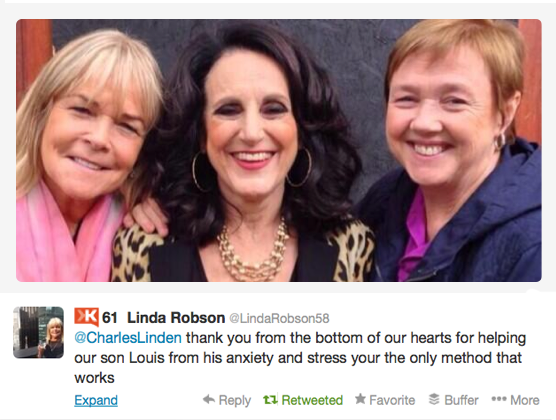Anxiety and Depression What is depression & how does it relate to anxiety?
How many doctors described me as depressed before they changed the diagnosis to anxiety?
All of them!
Probably six to eight over the decade I looked for help.
Did anyone ever mention anxiety to me?
In passing yes, but they harped on and on about depression for years before I discovered that, in fact, although I sometimes felt thoroughly fed up with my 'lot', it wasn't depression at all.
I was experiencing what 100% of anxiety disorder sufferers experience day in and day out... the desperation and frustration, sadness and anger that arise from the cycle of fear that grips them.
When I discovered this and took action, everything changed.
Often, doctors will diagnose depression and prescribe antidepressant medication when anxiety is actually the root disorder. When they are presented with anxiety disorder symptoms they often prescribe anti-depressant drugs in order to eliminate the symptoms experienced. Sometimes doctors do this out of ignorance, sometimes due to time constraints or resources and other times because it's just the easiest route to follow.
 JOIN NOW
JOIN NOWBut, the knock on effect can be
incredible.
The sufferer then walks away with a diagnosis of depression
and pills to reinforce the belief that they are in some way 'mentally
ill'. This is counter productive and misleading, but, all too common.
So why are depression and anxiety so different?
Anxiety and depression as far removed from each other as neck pain
and athletes foot.
Why?
Because anxiety is a behavioural condition that
is caused solely by a modification within the system that controls
anxiety levels (anxiety is an emotion); Depression is caused by a change
in the brain chemicals which control mood. Very different conditions
indeed.
Now, to add confusion... it IS possible for anxiety sufferers to
develop LOW MOOD as a symptom of their anxiety disorder, but they are
STILL separate conditions... like a knee cartilage sufferer developing
back pain from the way their leg bends.
Anxiety sufferers do not develop
true clinical depression... they may feel fed up, but, that is not true
depression.
True, clinical depression can be treated using medication to correct
brain chemistry although, in parts of the world where medication is too
expensive or unavailable, doctors prescribe lifestyle changes and
exercise with dramatic results.
Misdiagnosis of depression in anxiety is
common and mistreatment is just as common.
How do I know whether I have anxiety or depression?
There is a very simple way of determining whether you are suffering
from true clinical depression or anxiety-related depressive thoughts and
symptoms.
Ask yourself this: Did you feel depressed or anxious first?
As I said earlier, if you experience symptoms of anxiety which make
you feel down, fed up, depressed, chances are you are suffering from
anxiety-related low mood.
Anxiety causes sufferers to feel down, isolated and frustrated which
can lead to feelings of depression including depressive, weird and
sometimes frightening thoughts.
Sufferers have told us about a wide
range of thought patterns including feeling suicidal or wanting to
self-harm.
The Linden Method can it help me if I have clinical depression?
The Linden Method was developed initially to eliminate anxiety disorders such as GAD, panic disorder, phobias and OCD. However, over time, many depression sufferers have also joined The Linden Method.
It has become apparent that even sufferers of clinical depression have benefited enormously from the structured programme of recovery in The Linden Method programme and many have made full recoveries using our Method.
No matter what other conditions you have; if you experience any form of anxiety at all, The Linden Method will show you how you can permanently and quickly eliminate it. If you suffer from clinical depression, with or without anxiety, regardless of whether you take medication or not, you will, almost definitely, benefit from the Linden Method, as it helps you to regain structure in your life and build rewarding challenges in order to make your life fulfilling once again.
Anxiety and depression are not linked physiologically, but I know from personal and professional experience that anxiety and low mood are related... but not by illness, more by the feelings of helplessness, desperation, sadness and frustration an anxiety sufferer experience.
I also know that by addressing anxiety directly, symptoms that manifest as low mood or depression can be eliminated quickly. I was amazed at just how quickly positivity took over in my life... like going on a diet, anxiety elimination can give you quick results which snowball into total recovery.






Thank you! Your submission has been received!
Oops! Something went wrong while submitting the form